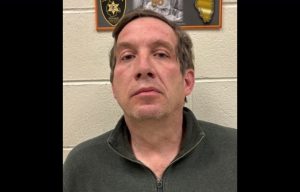Prairie du Rocher levee facing financial pressures

Pictured is a flood gate on the Prairie du Rocher levee system.
The levee that protects Prairie du Rocher has been the focus of millions of dollars of work in recent years to ensure the community’s safety. But now, as much of this work is being completed, levee Commissioner Stephen Gonzalez says the district, and the citizens and businesses it protects, face a critical challenge made worse by a dwindling timeline to raise funds critical to its completion.
Last spring, the levee district entered into an agreement with the U.S. Army Corps of Engineers to have the levee assessed to certify it provides a “100-year level of protection” — the standard necessary to avoid the requirement to purchase expensive flood insurance on all mortgaged private and commercial property.
The levee district agreed to pay about $103,000 to the corps to evaluate the levee, and the levee district implemented an increase in assessments to pay for it. To date, two installments totaling $41,000 have been paid.
“We have a very good relationship with the Corps of Engineers,” Gonzalez told the Republic-Times Friday. “They have spent a lot of money making repairs and taking other steps.”
But until the levee district raises the $62,000 still outstanding, the certification process can’t proceed, according to Gonzalez.
A Corps of Engineers levee expert confirmed the agency has been contracted with to do the work, but said their regulations prohibit them from beginning until the district pays the entire fee.
Once the corps performs the study, it will make a recommendation to FEMA, which oversees the National Flood Insurance Program. FEMA will then decide whether or not to require property owners to purchase flood insurance.
Gonzalez said the levee district has received substantial federal grant funding but law prohibits using it to pay another federal bill. And while there are ways to raise the money, the legal process and time required to execute them are the problem.
Failing to gain certification of the levee system is potentially catastrophic for the community. If they are not certified as 100-year levees, FEMA will require property owners to purchase flood insurance on all mortgaged property. For modest real estate mortgages, flood insurance costs could approach or exceed the principal mortgage amount.
Gonzalez said the levee district is exploring a “tax anticipation loan” — a commercial bank loan to be repaid by future tax receipts. But qualification requirements are strict and detailed. The district could also seek a special assessment, but even that may not raise the money in time, he said.
In the meantime, two other avenues to raise the money are being pursued. Both call for donations by the public, with hopefully larger amounts coming from corporate supporters who stand to lose a great deal.
A GoFundMe campaign has raised $2,725, including a $1,000 anonymous donation.
Donations can also be made directly to the Community Foundation of Randolph County, a 501c3 tax exempt organization.
“We can do this,” Gonzalez said. “But time is of the essence.”
In the meantime, the levee district must continue to maintain the complex system during this rainy spring.
“Prairie du Rocher is anticipating its 300th anniversary in a few years. Loss of levee certification would have devastating impact on the community and its ability to reach that milestone and beyond,” said Prairie du Rocher Chamber of Commerce President Amy Barbeau.
The GoFundMe page is located at www.GoFundMe.com/SavePDRlevees.
To donate directly to the Community Foundation of Randolph County visit www.cfrandolphco.org or call 618-826-5000, ext. 221.






